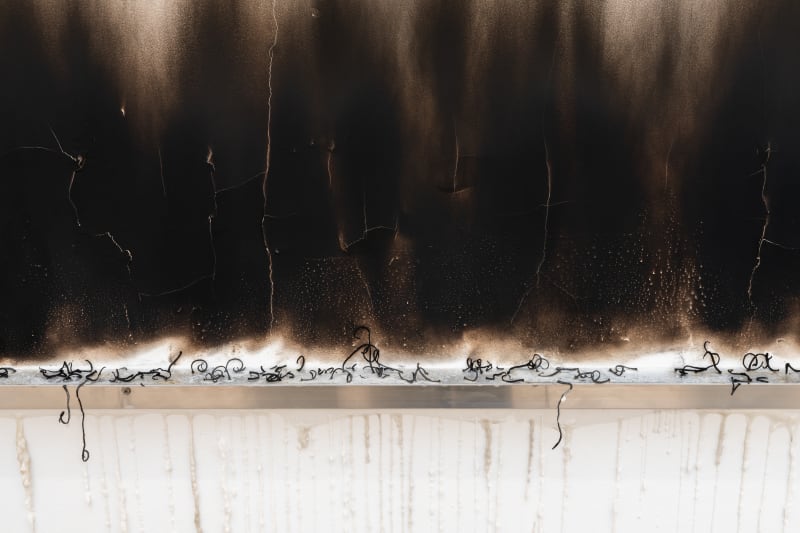Antares challenges linear narratives and rigid ideologies that once defined our understanding of the world, yet now fail to anchor us in an era where certainty dissolves by the day. Like the bright, red star Antares, historically used as a navigational reference across cultures, the exhibition offers a celestial map of orientation that is guided by a sensitivity to the shifting ground beneath, offering tactile coordinates within an increasingly digital landscape.
Antares draws critically from the legacy of twentieth-century Brazilian modernism, a movement that presented itself as a universal language of progress. Its clean structures and controlled designs signalled order and clarity, yet in practice they often hid inequality and reinforced authority. De Azambuja turns to concrete, once modernity’s emblem, for its paradoxical nature between its grounding purpose and sense of alienation. Cracks are left visible; seeds and fingerprints interrupt its polished surface. What once claimed to be smooth and rational is revealed as fragile, shaped and strained by the weight of its own ideology.
The exhibition echoes the speculative energy of the utopian architectural movements of the 1960s–70s, when cosmic imagery was used to imagine alternative futures. However, where those projects often sought transcendence through technological optimism, Antares grounds this impulse in material critique. Instead of escape, it asks what it means to reorient from within.
Together, the works trace how ideology embeds itself in matter, and how resistance may arise not through destruction, but through recalibration. Orientation, the exhibition argues, is no longer about following a fixed star — but recognising when it begins to shift.
Marlon de Azambuja (b.1978, Brasil, Porto Alegre), lives and works in Paris, France. De Azambuja works across a range of media including sculpture, installation, photography, and drawing. His work explores architecture and urbanism and the power-structures and norms that emanate from public space design choices. He is particularly interested in the history of Modernist architecture in Brazil and how this has affected collective consciousness and affected people’s lives. Frequently using found materials, De Azambuja’s work is often site-specific and strongly tied to the location he physically intervenes in. De Azambuja is recognized as one of the leading contemporary artists in Brazil, and his work has received critical acclaim for its thought-provoking exploration of social and political issues.
Recent solo exhibitions include Legado, Sagrada Mercancia, Santiago de Chile (2024); Nuclear, Galeria Maria Razuk, Sao Paulo (2022); Caminhar a Noite, Lehmann Silva, Oporto (2022); Foundation, Poush Manifesto, Paris (2021); Die Hohle, Imagine the City, Altlander Warehouses, Hamburg (2021); Fundação., Hangar, Lisbon (2020); La Expresión Americana - Sentir la Visión, MEIAC, Badajoz (2019); PostCrisis, Alimentación 30, Madrid (2019); Brutalismo Americano, Kadist Art Founda on, San Francisco (2017). De Azambuja has had group exhibitions at A Deeper Shade of the Soul , 3h3 Biennial, Oosterhout (2025); This is a Shot , Serralves Fondation, Porto (2025); Par quatre chemin, Château Lacoste, Aix-en-Provence (2025); Zhi Art Museum, Chengdu (2024); Wehmuehle Museum, Berlin (2024); The Shadow Over Everything, Mabiti Oasis, AlUla (2024); ; Beneath the Surface, Behind the Escenes, Heide Museum, Melbourne (2023); Fundación Casa Wabi, Museo de Arte Contemporáneo de Querétaro (2022); Dos Instalaciones, Espacio Temporal, Pantin (2021); Cristina Guerra Contemporary Art, Lisbon (2019); Cleveland
Museum of Arts, Cleveland (2018). His work is in various notable collections, including the Ministry of Culture, Spain; Kadist Art Foundation, San Francisco; Museo Oscar Niemeyer,
Brazil; and Nomas Foundation, Rome.

